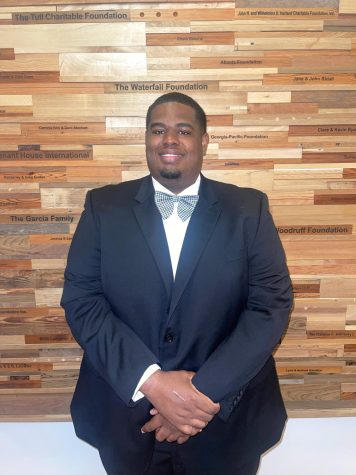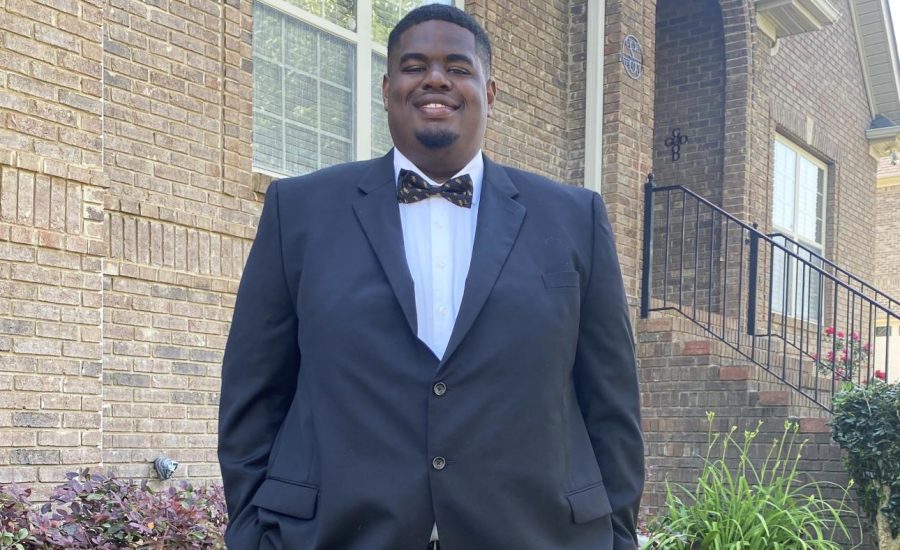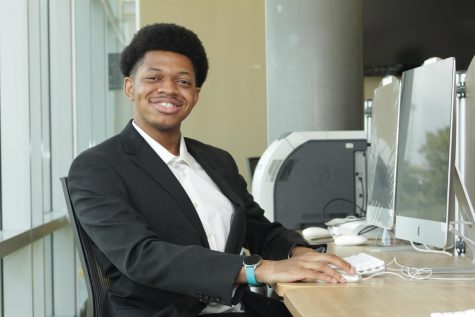Senior Hunter Smith thankful for faculty support at ASU
After transferring from Lincoln University in Jefferson City, Missouri, Hunter Smith selected to transfer to Alabama State University where he found faculty support from professors Charlie Gibbons, Ed.D., and Barbara Williams.
May 6, 2022
Success is often measured by several factors that pinpoint or highlight the accomplishment of your goals. While some people measure success by the amount of effort, profitability, and satisfaction, some define success as groundbreaking milestones and chapters of their lives. As each person’s journey progresses individually, their connotation of success alters, and for graduating senior physical education major Hunter Smith, he defines success as graduating from college, a feat that is few and far between for minorities.
Originating from Birmingham, Alabama, Smith initially did not attend Alabama State University. He was a Lion at Lincoln University in Jefferson City, Missouri, where he played football and was involved in various organizations and activities. It was not until his sophomore year in 2019 that Smith made the transition from a Lion to the stinging Hornets and its ever-loving family essence of Hornet Nation.
“During my time at Lincoln, it was challenging for me,” he said. “ I had never been that far from home before, and while I was there, I started to lose family members. Also, while I was going through that, I had to balance playing football and school. Ultimately, things didn’t work out, and I decided to leave.”

The vast array of academic programs and opportunities at Alabama State University is what attracted him to finally make the switch, especially to the College of Education.
Upon entering the university, Smith had to catch up on a few credits before establishing physical education as his major. However, he believes that he did not choose physical education, specifically recreational therapy, as a pathway, but recreational therapy chose him. Hoping to eventually venture into physical therapy and work in sports management, Smith’s adviser thought it would be best for him to initially start there and then segue into his intended field of study.
As a Hornet, his most notable interaction with the university and its student body was working with the Student Government Association (SGA) underneath the SGA President David Hammond and the “No Limit” administration in the 2020-21 academic year, in which Smith and Hammond built a close relationship through the various events and parties thrown throughout the academic year.
“I think Alabama State is more like a family than all the other colleges I’ve been at,” Smith said. “We’re very tight knit. We basically know everybody. And working with David was pretty cool. He was always the life of the party and got everyone turned up.”
A member of the Student Senate in the College of Health Sciences, the Birmingham, Alabama, native was responsible for representing and advocating for those students majoring in that field. He remembers the long days and nights of ensuring that he was able to remain vocal and steadfast in fulfilling his job duties and responsibilities.
“My duties were to be knowledgeable of the student’s needs for the college I was assigned and to address campus-wide issues,” Smith said. “The way we were able to present solutions to the problems students faced on campus was in the format of bills. I also had the chance to serve on the Confirmations Committee in the SGA. I conducted interviews with people that wanted to be inducted into positions throughout the SGA.”
Apart from the SGA, Smith was inducted into the National Society of Leadership and Success (NSLS), an organization that provides a life-changing leadership program that helps students achieve personal growth, career success, and empowers them, which amplified his community service and volunteerism.
Inside the classroom, organic chemistry proved to be the most challenging class Smith encountered, while African American studies showcased a vibrant, vivacious and enthralling side of academics in which he loved tremendously.
“In organic chemistry, you have to remember a lot of formulas and equations to be successful in that class which was very challenging,” he said. “ However, taking the African American Studies class and being able to learn about the history that we come from has always been interesting to me.”
While matriculating through his four-year journey, a special select few of professors left an everlasting impact and mark on Smith’s academic and professional self. Out of all of the classes taken, from the most challenging to the most intriguing, Smith boldly remembers and gives his greatest appreciation to Charlie Gibbons, Ed.D. Health Education, M.Ed. Physical Education, who became a familiar face as he instructed several of his required courses.
Emphasizing the influential presence left by Gibson, Smith ensured to not forget about Barbara Williams, M.Ed., professor and renowned head women’s softball coach at the university. Williams is so highly revered inside and outside the classroom that the softball complex is honored after her legacy and named the Barbara Williams Softball Complex.
“Dr. Williams and Dr. Gibbons were extremely graceful and caring when it came to teaching and making sure everyone got the concepts before moving on,” Smith said. “It is extremely important, especially in our field, to know what you are doing correctly without being confused and I definitely liked that about them, along with various other things.”
Although Smith had a stimulating curriculum and engaging professors, 2020 proved to be a challenging year for most as the COVID-19 pandemic emerged, halting and altering everything, but for him, he was able to take the negative and turn it into a positive.
“The recreation therapy classes are a mixture of online and in-person prior to COVID-19,” Smith said. “So I really didn’t have a problem with going online because I’m basically a visual learner. So if you give me a set of slides or you have a recording of your lecture, I can learn through that avenue. But I do know that some students do need in-person interactions for them to be able to learn. So my heart went out to them.”
With the huge transition from in-person learning to strictly online, several students were housed on campus and virtually were not allowed to leave their room, and with this situation, it allowed Smith to realize one huge issue that he believes the university needs to address immediately: housing.
Since most college students come for the full experience of living on-campus, making new friends and creating new memories, housing seems to be the most important part of a university since it is where most students live while attending college. At ASU, there are nine dormitories that students can select from depending on classification and gender and one that is coed.
Housed in Facility I, located on the east side of the university, Smith was able to obtain what he believes to be the “best” housing on campus. Even with that luxury, he had friends who lived in John W. Abercrombie Hall, built in 1947, and Willease S. Simpson Hall, built in 1966, where he saw how dilapidated and tarnished those buildings were.
“Simpson is terrible,” he said. “They really do need to tear it down. They don’t need to renovate it. They just need to tear it down and rebuild it. In Abercrombie, they probably need to do the same thing to that one too. So in my past four years, housing is definitely a huge priority that needs to be addressed.”
After graduation, Smith will be attending the University of North Alabama to obtain his master’s degree in sports and recreation management this fall. He plans to join his local alumni association in Birmingham and become fully immersed in the alumni community and culture that the Hornet Nation emits. If asked, he would certainly return to his alma mater to work in sports management.
Currently, he is interning with the Covenant House of Georgia in Atlanta, Georgia, where he serves youth between the ages of 18 and 24 years old who experience homelessness.
One tangible aspect that Smith will take away from ASU is learning how to deal with different personalities, lifestyles and attitudes.
“At ASU, you will come across a variety of different people and being able to sit and speak and get along with those people will help me out in the long run as I start my profession,” he said.
He describes the university in one sentence as “O’ Mother Dear with tons of history,” and when he is not busy doing homework, participating in different organizations or hanging out with friends, he enjoys playing football and basketball, swimming, and listening to music.
To any graduating high school student considering attending the illustrious HBCU known for its Mighty Marching Hornets, Stingettes, Honeybeez, and wonderful architecture, Smith advises those students to “buckle down.”
“Focus,” Smith said. “College has a lot of distractions. When I first came to State, I entered the party scene, which was fun initially but had a lot of negative outcomes. You can get off track very easily. College can be a great experience if you buckle down with your schoolwork and actually get through your classes. It’s all about prioritizing and managing your time correctly. If you get that down pack, you can fully enjoy your four years of higher education.”








